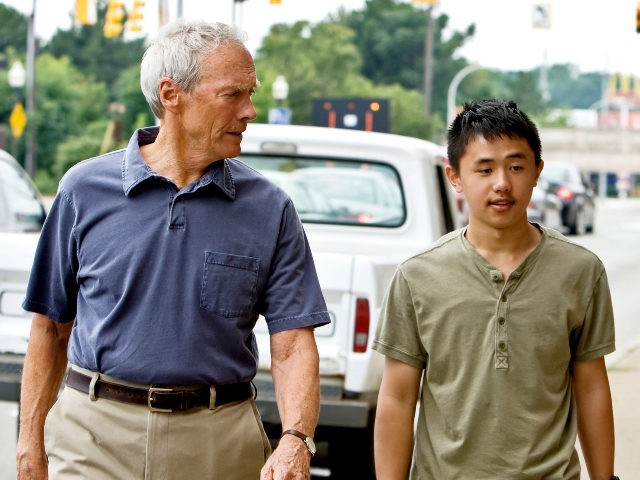It was only a matter of time before the left-wing cancel mob came for Gran Torino, Clint Eastwood’s 2008 movie about a bigoted retired autoworker and his Asian Hmong neighbors. The racial epithets spewed by protagonist Walt Kowalski are so prolific that it’s hard to imagine the movie being released under today’s ultra-woke Hollywood standards.
Anyone who’s seen Gran Torino and has half a brain will easily grasp that the movie is the opposite of racist. After Walt catches Thao, the Hmong teenager next door, trying to steal his cherished 1972 Gran Torino, he puts the boy to work fixing houses around the neighborhood. Walt grudgingly becomes his mentor, his friend, and eventually his father figure. In the end, he makes the ultimate sacrifice to protect Thao and his family from local Hmong gangbangers.
None of that matters anymore because Gran Torino is now officially problematic. The wave of physical assaults on Asian Americans has unleashed a woke backlash against the movie — more than ten years after it was released — with some accusing it of perpetuating Asian hate and trafficking in negative stereotypes.
Watch below:
Surprisingly, some of those attacks are coming from people who worked on the movie. Actor Bee Vang, who plays Thao, has all but disavowed the film, claiming in a recent op-ed for NBC News that the movie “mainstreamed anti-Asian racism,” adding that he is still haunted by the laughter of white audiences at Walt’s racial slurs.
In a Medium post, Mai Xiong, who worked as a Hmong cultural consultant on the movie, alleges producers ignored her concerns about the movie’s ethnic slurs, which include “zipper head,” “swamp rat,” and “gook.” She also complains about the portrayal of Hmong gangbangers who terrorize Thao and his family, saying the movie fails to address the socio-economic factors that can lead to organized crime in minority communities.
Pulitzer Prize-winning novelist Viet Thanh Nguyen criticized the movie in a recent series of tweets in which he complained that the Hmong characters are “either gangsters or model minorities/allies in need of white rescue.” He also questions why Sue, Thao’s older sister, never pushes back against Walt for using words like “gook.”
Ridiculous. Maybe Sue has thick skin and isn’t bothered by it. She is a strong woman after all. More likely, she correctly intuits that cantankerous Walt sometimes uses racial epithets as a term of endearment — a uniquely American form of male bonding. She probably has more important things to worry about, like the gangs shooting up her house.
Of course Gran Torino isn’t responsible for perpetuating Asian hate. I could find no documented cases of crimes inspired by the movie, and even if there were, no filmmaker is responsible for the actions of a crazed fan. Taxi Driver didn’t shoot Ronald Reagan. John Hinkley did.
It’s true audiences laughed at Walt’s racist language. In fact, they still do. Walt’s ethnic slurs have been endlessly memed on social media and a YouTube supercut of Gran Torino‘s worst insults — which include slurs against Latinos, blacks, Italians, and Polish people — has been viewed more than 3.5 million times.
People can laugh at a movie for many reasons. I admit I cracked up when Walt, who is a Korean War veteran, threatens a Hmong gangbanger who dared to trespass on his lawn: “I used to stack fucks likes you five feet high in Korea, used ya for sand bags.” It’s a great line.
I suspect most people laughed not because they find racism funny but because Walt’s unfiltered language is so alien and taboo to today’s ear that it produces a strong emotional reaction. We laugh at Walt like we laugh at Archie Bunker.
Ultimately, the left is targeting Gran Torino for many of the same reasons they attacked American Sniper. Both movies ask you to identify with a white, (probably) conservative male from middle America who is skilled at firearms and who uses racist language but who deep down is compassionate and moral. Human complexity used to be something the left valued at the movies. Now they’re scared of it.
In today’s woke mindset as dictated by critical race theory, you’re either racist or anti-racist. And because Walt Kowalski is neither of those, he must be cancelled.
I’m not surprised the leftist mob is attacking Gran Torino. I think it’s kind of amusing in a misguided way. What’s more disturbing is the silence from professional film critics and scholars whose job is to defend art against the wrongheaded passions of the moment. Instead of standing up for movies like Gone with the Wind and Guess Who’s Coming to Dinner — which have been labeled “troubling and problematic” — they are hiding under their desks, hoping the mob will pass them by. Shame on all of them.
For me, Gran Torino gets better each time I see it. Time will tell if it’s a true masterpiece but I have a good feeling about it. Eastwood’s sense of pacing strikes me as close to perfect, especially in the final half hour. The Catholic themes of guilt and salvation feel more pronounced, but not in a didactic way. Walt is a religious skeptic to say the least, but he achieves a spiritual grace.
In the end, Walt doesn’t leave his beloved Gran Torino to his selfish children or grandchildren. Thao is the inheritor of the American Dream because he worked hard and earned it. The last shot shows him driving the open road: a boy, his dog, and his car. What could be more American than that?
Follow David Ng on Twitter @HeyItsDavidNg. Have a tip? Contact me at dng@breitbart.com.

COMMENTS
Please let us know if you're having issues with commenting.